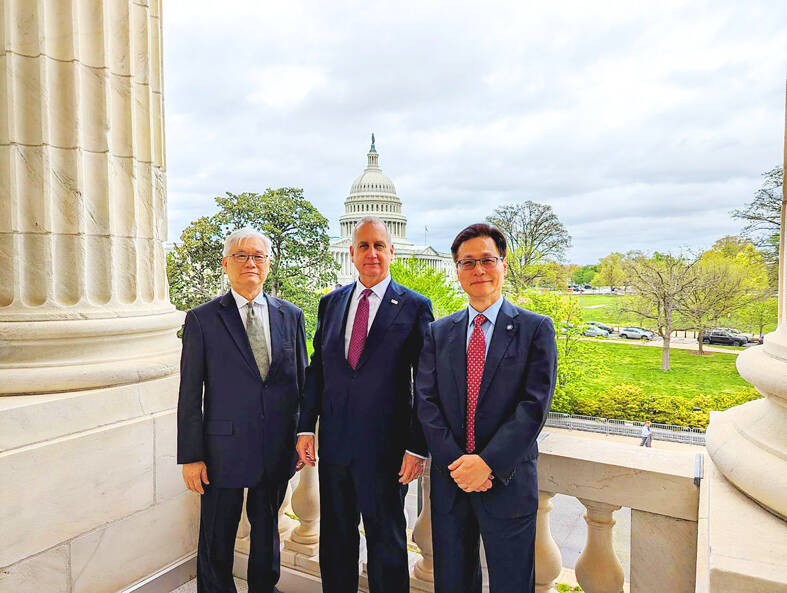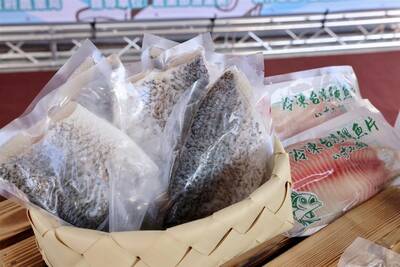Chinese Nationalist Party (KMT) Vice Chairman Andrew Hsia (夏立言) on Thursday thanked US lawmakers for their support of Taiwan, adding that the KMT would strive to improve inter-parliamentary exchanges as the majority party in the legislature.
Hsia, currently visiting the US, made the remark during a meeting with US representatives Mario Diaz-Balart, chair of the Congressional Taiwan Caucus, and Ro Khanna, a member of the House Armed Services committee, KMT assistant director of international affairs Howard Shen (沈正浩) said.
The KMT vice chairman told the two lawmakers that his party’s foreign policy is to show an affinity toward the US, pursue friendship with Japan and make peace with China, Shen said.

Photo courtesy of the KMT
Hsia also discussed the KMT’s stance on US-Taiwan relations, cross-strait relations and Legislative Yuan reform with the staff of several US senators on the Senate Committee on Foreign Relations, and extended an invitation for them to visit their KMT counterparts, Shen added.
He traveled to the US to see old friends, exchange views about the KMT’s future with academics and think tanks, and explain the KMT’s national defense policy to the US, Hsia told reporters in Washington on Friday.
He also made it clear to the US that the KMT supports Taiwan increasing its defense budget and purchasing arms, and that comments by its members at the legislature should not be interpreted as opposition to efforts toward strengthening Taiwan’s defensive capabilities, Hsia added.
However, in addition to strengthening Taiwan’s defenses, the two sides of the Taiwan Strait must also have channels for dialogue and communication, he said, citing the meeting between former president Ma Ying-jeou (馬英九) and Chinese President Xi Jinping (習近平) in Beijing as a good example.
The KMT has always supported the promotion of dialogue and communication that are conducive to cross-strait stability and peace, Hsia said, adding that Ma’s visit to China is a plus for the KMT.
Hsia said he is to visit Shaoxing City in China’s Zhejiang Province later this month to participate in cultural activities to honor Xia Yu, also known as Yu the Great, the founder of the Xia Dynasty.
The organizers have invited him to the annual event for the past three years, but due to the COVID-19 pandemic, it could only be held remotely, he said.
Hsia has been on back-to-back visits to China in February and last month, earning media criticism for the frequency of his trips.
His visits were to serve Taiwanese entrepreneurs there, as there are about 150 Taiwanese trade associations in China, and attend cultural events to which he was specifically invited, Hsia said in response.

Taiwan's Vice President Hsiao Bi-khim (蕭美琴) said Saturday that she would not be intimidated by the Chinese Communist Party (CCP), following reports that Chinese agents planned to ram her car during a visit to the Czech Republic last year. "I had a great visit to Prague & thank the Czech authorities for their hospitality & ensuring my safety," Hsiao said on social media platform X. "The CCP's unlawful activities will NOT intimidate me from voicing Taiwan's interests in the international community," she wrote. Hsiao visited the Czech Republic on March 18 last year as vice president-elect and met with Czech Senate leadership, including

There have been clear signs of Chinese Communist Party (CCP) attempts to interfere in the nationwide recall vote on July 26 in support of Chinese Nationalist Party (KMT) legislators facing recall, an unnamed government official said, warning about possible further actions. The CCP is actively involved in Taiwanese politics, and interference in the recall vote is to be expected, with multiple Chinese state media and TAO attempts to discredit the Democratic Progressive Party (DPP) and undermine public support of their recall movement, the official said. This interference includes a smear campaign initiated this month by a pro-Beijing Hong Kong news outlet against

A week-long exhibition on modern Tibetan history and the Dalai Lama’s global advocacy opened yesterday in Taipei, featuring quotes and artworks highlighting human rights and China’s ongoing repression of Tibetans, Hong Kongers and Uighurs. The exhibition, the first organized by the Human Rights Network for Tibet and Taiwan (HRNTT), is titled “From the Snowy Ridges to the Ocean of Wisdom.” “It would be impossible for Tibetans inside Tibet to hold an exhibition like this — we can do it. because we live in a free and democratic country,” HRNTT secretary-general Tashi Tsering said. Tashi Tsering, a Taiwan-based Tibetan who has never

A first shipment of five tons of Taiwan tilapia was sent from Tainan to Singapore on Wednesday, following an order valued at NT$600,000 (US$20,500) placed with a company in the city. The products, including frozen whole fish and pre- cooked fish belly, were dispatched from Jiangjun Fishing Harbor, where a new aquatic processing and logistics center is under construction. At the launch, Tainan Mayor Huang Wei-che (黃偉哲) called the move a “breakthrough,” marking Taiwan’s expansion into the Singaporean tilapia market. Taiwan’s tilapia exports have traditionally focused on the United States, Canada, and the Middle East, Huang said, adding that the new foothold in